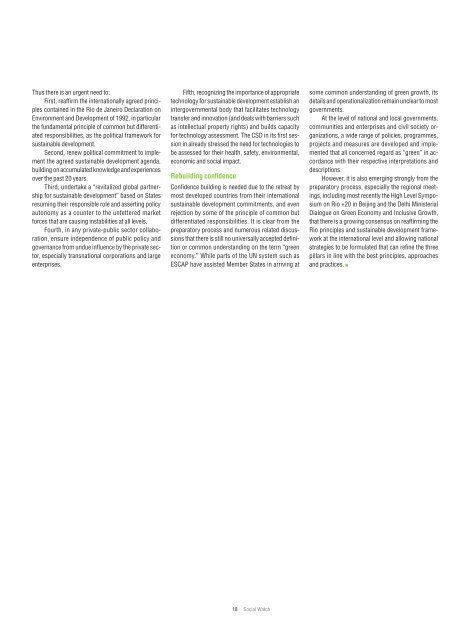burden of deforestation, desertification, erosion of ... - Social Watch
burden of deforestation, desertification, erosion of ... - Social Watch
burden of deforestation, desertification, erosion of ... - Social Watch
You also want an ePaper? Increase the reach of your titles
YUMPU automatically turns print PDFs into web optimized ePapers that Google loves.
Thus there is an urgent need to:<br />
First, reaffirm the internationally agreed principles<br />
contained in the Rio de Janeiro Declaration on<br />
Environment and Development <strong>of</strong> 1992, in particular<br />
the fundamental principle <strong>of</strong> common but differentiated<br />
responsibilities, as the political framework for<br />
sustainable development.<br />
Second, renew political commitment to implement<br />
the agreed sustainable development agenda,<br />
building on accumulated knowledge and experiences<br />
over the past 20 years.<br />
Third, undertake a “revitalized global partnership<br />
for sustainable development” based on States<br />
resuming their responsible role and asserting policy<br />
autonomy as a counter to the unfettered market<br />
forces that are causing instabilities at all levels.<br />
Fourth, in any private-public sector collaboration,<br />
ensure independence <strong>of</strong> public policy and<br />
governance from undue influence by the private sector,<br />
especially transnational corporations and large<br />
enterprises.<br />
Fifth, recognizing the importance <strong>of</strong> appropriate<br />
technology for sustainable development establish an<br />
intergovernmental body that facilitates technology<br />
transfer and innovation (and deals with barriers such<br />
as intellectual property rights) and builds capacity<br />
for technology assessment. The CSD in its first session<br />
in already stressed the need for technologies to<br />
be assessed for their health, safety, environmental,<br />
economic and social impact.<br />
Rebuilding confidence<br />
Confidence building is needed due to the retreat by<br />
most developed countries from their international<br />
sustainable development commitments, and even<br />
rejection by some <strong>of</strong> the principle <strong>of</strong> common but<br />
differentiated responsibilities. It is clear from the<br />
preparatory process and numerous related discussions<br />
that there is still no universally accepted definition<br />
or common understanding on the term “green<br />
economy.” While parts <strong>of</strong> the UN system such as<br />
ESCAP have assisted Member States in arriving at<br />
18 <strong>Social</strong> <strong>Watch</strong><br />
some common understanding <strong>of</strong> green growth, its<br />
details and operationalization remain unclear to most<br />
governments.<br />
At the level <strong>of</strong> national and local governments,<br />
communities and enterprises and civil society organizations,<br />
a wide range <strong>of</strong> policies, programmes,<br />
projects and measures are developed and implemented<br />
that all concerned regard as “green” in accordance<br />
with their respective interpretations and<br />
descriptions.<br />
However, it is also emerging strongly from the<br />
preparatory process, especially the regional meetings,<br />
including most recently the High Level Symposium<br />
on Rio +20 in Beijing and the Delhi Ministerial<br />
Dialogue on Green Economy and Inclusive Growth,<br />
that there is a growing consensus on reaffirming the<br />
Rio principles and sustainable development framework<br />
at the international level and allowing national<br />
strategies to be formulated that can refine the three<br />
pillars in line with the best principles, approaches<br />
and practices. n

















